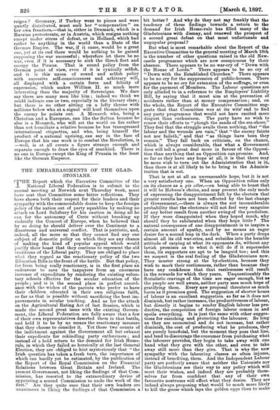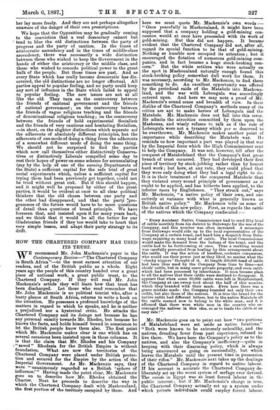THE EMBARRASSMENTS OF THE GLAD- STONIANS.
THE Report which the Executive Committee of the National Liberal Federation is to submit to the annual meeting at Norwich next Thursday week, must have cost that Committee some bitter reflections. They have shown both their respect for their leaders and their sympathy with the commendable desire to keep the foreign policy of the nation out of party squabbles by making no attack on Lord Salisbury for his caution in doing all he can for the autonomy of Crete without breaking up violently the Concert of Europe, when he believed that by so doing he should deliver over the Continent to a disastrous and universal conflict. That is patriotic, and, indeed, all the more so that they cannot find any one subject of domestic policy on which they see any chance of making the kind of popular appeal which would justify their boast that they continue to represent the old traditions of the Liberal party. They are obliged to place what they regard as the reactionary policy of the two Education Bills in the front of the battle. But that policy, far from being really reactionary, is in the first place an endeavour to save the taxpayers from an enormous increase of expenditure by rendering the existing volun- tary schools effective for the secular education of the people ; and is in the second place in perfect accord- ance with the wishes of the parents who prefer to have their children educated in their own religious faith, so far as that is possible without sacrificing the best im- provements in secular teaching. And as for the attack on the Agricultural Rating Act of last Session, which is made the second great issue with the existing Govern- ment, the Liberal Federation are fully aware that a few of their own representatives deserted them in that battle, and held it to be by no means the reactionary measure that they choose to consider it. Yet these two counts of the indictment against the Government all but exhaust their expedients for rekindling party enthusiasm ; and instead of a bold return to the demand for Irish Home- rule, in which they failed so heroically at the last General Election, they are obliged to hint mysteriously that " the Irish question has taken a fresh turn, the importance of which can hardly yet be estimated, by the publication of the Report of the Royal Commission on the Financial Relations between Great Britain and Ireland. The present Government, not liking the findings of that Com- mission, has resorted to the extraordinary device of appointing a second Commission to undo the work of the first." Are they quite sure that their own leaders are unanimous in liking the findings of that Commission a bit better ? And why do they not say frankly that the tendency of those findings towards a return to the demand for Irish Home-rule has filled many of the Gladstonians with dismay, and renewed the prospect of a second great defeat on that most unfortunate and unpopular proposal?
But what is most remarkable about the Report of the Executive Committee to the general meeting of March 18th is the number of other questions raised in the old New- castle programme which are now conspicuous by their absence. There appears to be no war-cry of "Down with the House of Lords." There appears to be no cry of "Down with the Established Churches." There appears to be no cry for the suppression of public-houses. There appears to be no cry for extension of the suffrage, or even for the payment of Members. The Labour questions are only alluded to in a reference to the Employers' Liability Bill, by saying that it must aim at the prevention of accidents rather than at money compensation; and, on the whole, the Report of the Executive Committee sug- gests that that Committee was at its wits' end to find any party programme that would not have excited more disgust than enthusiasm. The party have no wish to renew their efforts to "plough the sands of the sea-shore." They feel that the struggle avails them nothing, that "the labour and the wounds are vain," that " the enemy faints not nor faileth," and that " as things have been they remain." They fall back on criticism, on the chance, which is always considerable, that what a Government does will tell a great deal more in favour of the Opposi- tion than anything that an Opposition can promise. And, so far as they have any hope at all, it is that there may be more wish to turn out the Administration that is in, than there is at all likely to be to bring in the Adminis- tration that is out.
That is not at all an unreasonable hope, but it is not a very satisfactory one. When an Opposition relies only on its chance as a pis aller,—on being able to boast that it will be Hobson's choice, and may present the only mode of expressing the disappointment felt by the electors that greater results have not been effected by the last change of Government,—there is always the not inconsiderable probability that the electorate will not feel very sanguine of any better result from another swing of the pendulum. If they were disappointed when they hoped much, why should they be exhilarated when they hope little ? The natural consequence of one disappointment is to inspire a certain amount of apathy, and by no means an eager desire for a second leap in the dark. When a party drops almost all its old war-cries, and subsides into the humble attitude of carping at what its opponents do, without any lavish promises as to what it will do if it supersedes them, its supporters are apt to be languid too; and this we suspect is the real feeling of the Gladstonians now. They muster strong at the by-elections, because they wish to mark their restlessness, rather than because they have any confidence that that restlessness will result in the rewards for which they yearn. Unquestionably the Socialistic cravings of the time are eager enough, but as the people are well aware, neither party sees much hope of gratifying them. Every new proposal threatens as much harm as it promises good. The suggestion of shorter hours of labour is an excellent suggestion so far as it does not diminish, but rather increases, the productiveness of labour, but directly it begins to render English labour less pro- ductive, the competition of foreign labour conies in and spoils everything. It is just the same with other sugges- tions for enriching and protecting the labourer. So long as they are economical and do not increase, but rather diminish, the cost of producing what he produces, they are purely beneficial, but the moment they pass that line, and tend to discourage the consumer from purchasing what the labourer provides, they begin to take away with one hand what they give with the other, and even to take away still more than they give. That is why the new sympathy with the labouring classes so often injures, instead of benefiting, them. And the Independent Labour party are perfectly aware that neither the Unionists nor the Gladstonians see their way to any policy which will meet their wishes, and indeed they are probably them- selves far from confident that any of their own favourite nostrums will effect what they desire. They are indeed always proposing what would be much more likely to kill the goose which lays the golden eggs than to make her lay more freely. And they are not perhaps altogether unaware of the danger of their own prescriptions.
We hope that the Opposition may be gradually coming to the conviction that a real democracy cannot but tend to blur the old distinctions between the party of progress and the party of caution. In the times of aristocratic ascendency and in the times of middle-class ascendency, there was necessarily a wide distinction between those who wished to keep the Government in the hands of either the aristocracy or the middle class, and those who wished to concede political power to the great bulk of the people. But those times are past. And as every State which has really become democratic has dis- covered, the old distinctions are no longer effectual. All parties appeal to popular feeling, and no party could keep any sort of influence in the State which failed to appeal to popular feeling. The new issues are not at all like the old. They turn on the controversy between the friends of cantonal government and the friends of national government ; on the controversy between the friends of vague religious teaching and the friends of denominational religious teaching; on the controversy between the friends of bold experimental Socialism and the friends of very cautious and hesitating Socialism, —in short, on the slighter distinctions which separate not the adherents of absolutely different principles, but the adherents of one mode of doing a thing from the adherents of a somewhat different mode of doing the same thing. We should not be surprised to find the parties which now call themselves either distinctively Conserva- tives or distinctively Liberals compelled some day to rest their hopes of power on some scheme for accumulating (say by the help of one of the earning Departments of the State) a sufficient capital for the safe trial of great social experiments which, unless a sufficient capital for trying them had been previously got together, could not be tried without great risk. But if this should happen, and it might well be proposed by either of the great parties, it would be evident at once to all clear political thinkers that the old chasm between one party and the other had disappeared, and that the party 'pro- grammes of the future would have to be more questions of detail than questions of broad principle. We have foreseen that, and insisted upon it for many years back, and we think that it would be all the better for our Gladstonian friends if they too would take to heart that very simple lesson, and adapt their party strategy to its drift.







































 Previous page
Previous page